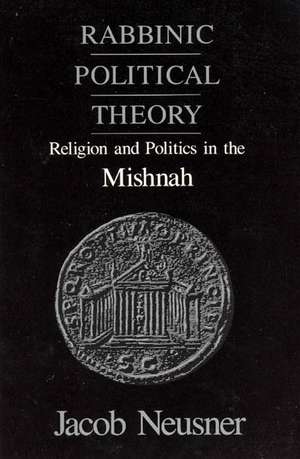Rabbinic Political Theory: Religion and Politics in the Mishnah: Chicago Studies in the History of Judaism
Autor Jacob Neusneren Limba Engleză Paperback – 31 mar 1991
In The Economics of the Mishnah Jacob Neusner showed how economics functioned as an active and generative ingredient in the system of the Mishnah. With this new study, Rabbinic Political Theory, he moves from the economics to the politics of the Mishnah, placing that politics in the broader context of ancient political theory.
Neusner begins his study with a modification of Weber's categories for a theory of politics: myth, institutions, administration, passion, responsibility, and proportion. Detailing the Mishnah's conception of politics, Neusner considers what he calls the stable and static structure and system through comparison with Aristotle. Although Aristotle's Politics and the Mishnah share a common economic theory based on the fundamental unit of the householder, they diverge in their conceptions of political structure and order. Aristotle embeds economics within political economy, while, Neusner argues, the Mishnah presents the anomaly of an economics separated from politics.
Using modern political terms, this study explicates the complicated politics developed by the philosopher-theologians of the Mishnah. It is a first-rate contribution to our understanding of the intersection of politics, political philosophy, and the Mishnaic system.
Neusner begins his study with a modification of Weber's categories for a theory of politics: myth, institutions, administration, passion, responsibility, and proportion. Detailing the Mishnah's conception of politics, Neusner considers what he calls the stable and static structure and system through comparison with Aristotle. Although Aristotle's Politics and the Mishnah share a common economic theory based on the fundamental unit of the householder, they diverge in their conceptions of political structure and order. Aristotle embeds economics within political economy, while, Neusner argues, the Mishnah presents the anomaly of an economics separated from politics.
Using modern political terms, this study explicates the complicated politics developed by the philosopher-theologians of the Mishnah. It is a first-rate contribution to our understanding of the intersection of politics, political philosophy, and the Mishnaic system.
Din seria Chicago Studies in the History of Judaism
-
 Preț: 215.51 lei
Preț: 215.51 lei -
 Preț: 321.18 lei
Preț: 321.18 lei -
 Preț: 293.81 lei
Preț: 293.81 lei -
 Preț: 263.53 lei
Preț: 263.53 lei -
 Preț: 261.66 lei
Preț: 261.66 lei -
 Preț: 291.90 lei
Preț: 291.90 lei -
 Preț: 312.70 lei
Preț: 312.70 lei -
 Preț: 294.96 lei
Preț: 294.96 lei -
 Preț: 288.42 lei
Preț: 288.42 lei -
 Preț: 284.56 lei
Preț: 284.56 lei -
 Preț: 293.04 lei
Preț: 293.04 lei -
 Preț: 231.56 lei
Preț: 231.56 lei -
 Preț: 315.58 lei
Preț: 315.58 lei -
 Preț: 263.57 lei
Preț: 263.57 lei -
 Preț: 320.80 lei
Preț: 320.80 lei -
 Preț: 248.05 lei
Preț: 248.05 lei - 20%
 Preț: 160.30 lei
Preț: 160.30 lei - 22%
 Preț: 522.75 lei
Preț: 522.75 lei - 12%
 Preț: 310.42 lei
Preț: 310.42 lei
Preț: 261.16 lei
Preț vechi: 310.04 lei
-16% Nou
Puncte Express: 392
Preț estimativ în valută:
49.97€ • 52.32$ • 41.35£
49.97€ • 52.32$ • 41.35£
Carte indisponibilă temporar
Doresc să fiu notificat când acest titlu va fi disponibil:
Se trimite...
Preluare comenzi: 021 569.72.76
Specificații
ISBN-13: 9780226576510
ISBN-10: 0226576515
Pagini: 284
Dimensiuni: 152 x 229 x 18 mm
Greutate: 0.32 kg
Ediția:1
Editura: University of Chicago Press
Colecția University of Chicago Press
Seria Chicago Studies in the History of Judaism
ISBN-10: 0226576515
Pagini: 284
Dimensiuni: 152 x 229 x 18 mm
Greutate: 0.32 kg
Ediția:1
Editura: University of Chicago Press
Colecția University of Chicago Press
Seria Chicago Studies in the History of Judaism
Notă biografică
Jacob Neusner is Graduate Research Professor of Religious Studies at the University of South Florida, Tampa. The Economics of the Misnah is also available from the University of Chicago Press.
Cuprins
Preface
Introduction
1. Defining a Politics and the Politics of a Religion
2. Defining a Judaism and the Judaism of the Mishnah
Part One - The Structure
3. Politics within the Judaic Myth
4. The Divine Plan of Perfect Hierarchy
5. Administering the Social Order
Part Two - The System
6. Passion: Sanctification
7. Responsibility: Intention
8. Transcending Power: Proportion and Governance
Part Three - The Politics of Judaism in Systemic Context
9. Judaism's Initial Politics: A Theory of Comparison and Contrast
10. Why Aristotle in Particular?
Introduction
1. Defining a Politics and the Politics of a Religion
2. Defining a Judaism and the Judaism of the Mishnah
Part One - The Structure
3. Politics within the Judaic Myth
4. The Divine Plan of Perfect Hierarchy
5. Administering the Social Order
Part Two - The System
6. Passion: Sanctification
7. Responsibility: Intention
8. Transcending Power: Proportion and Governance
Part Three - The Politics of Judaism in Systemic Context
9. Judaism's Initial Politics: A Theory of Comparison and Contrast
10. Why Aristotle in Particular?
